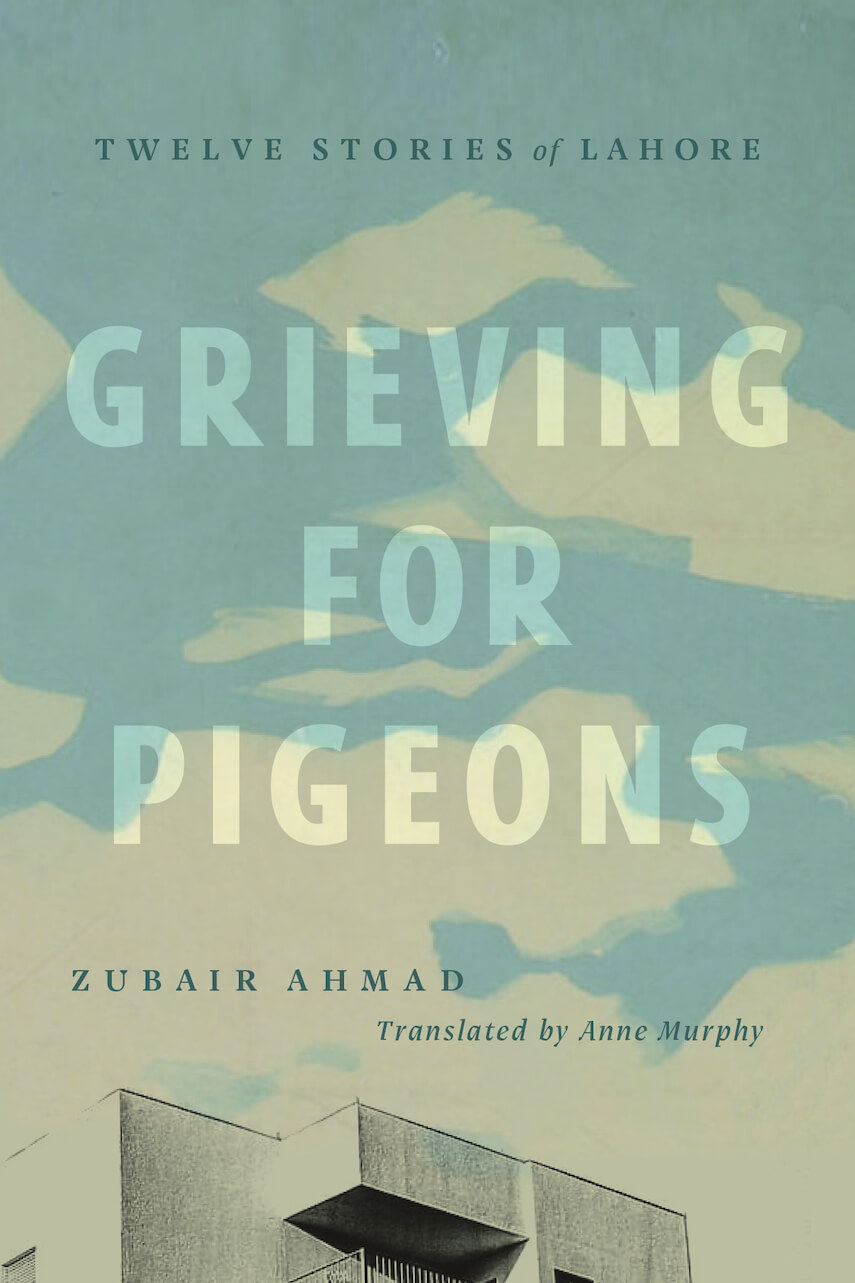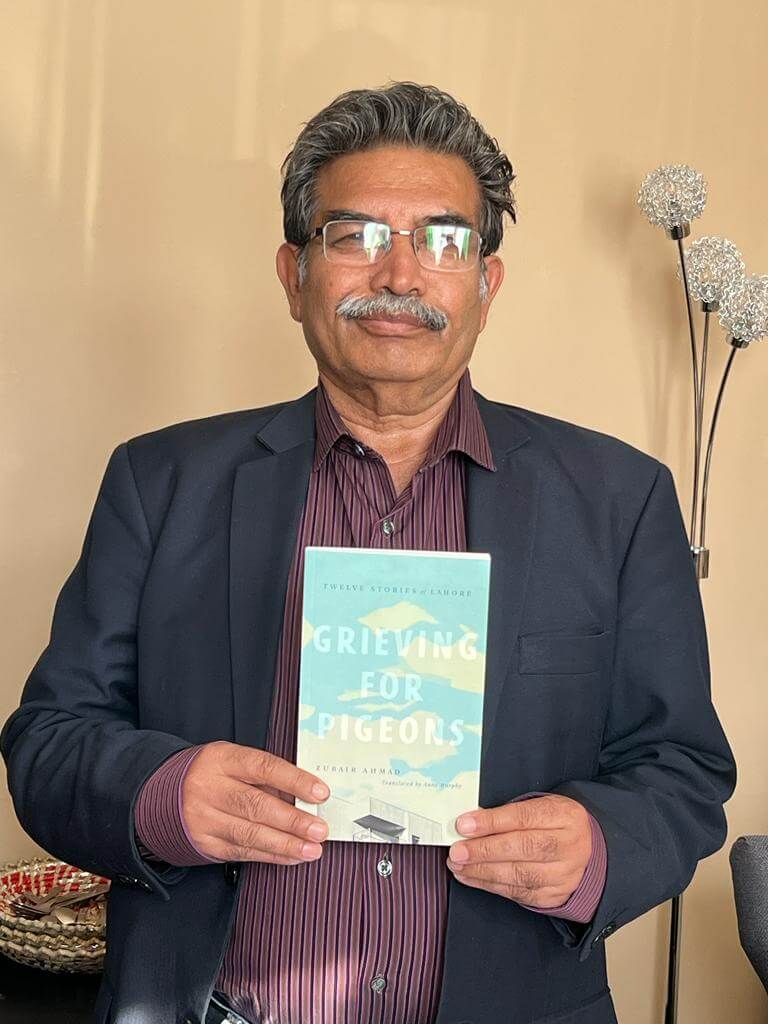May was a big month for our 2014 and 2020 Finalist, Zubair Ahmad. A selection of his Punjabi short stories have been published as an English-language collection titled, ‘Grieving for Pigeons: Twelve Stories of Lahore.’
According to Karyn Wisselink, Production and Promotions Coordinator at Athabasca University Press (AU Press), “this is one of the first works of Punjabi literature to be translated into English and published in the West.”
The newly translated book can be downloaded or read online for free at https://www.aupress.ca/books/120294-grieving-for-pigeons/
A print copy can also be purchased at the aforementioned link.
The 12 stories in this book were extracted from Zubair’s three Punjabi short story collections, two of which won finalist awards with the Dhahan Prize for Punjabi Literature.
“We were intrigued by Zubair’s work—his heart-rending stories…We felt that it was important to see these stories made available in English,” continues Karyn.

“the reviewers not only approved the manuscript for publication, they described the work as ‘lyrical and poetic’ and ‘delightfully meditative.’”
-Karyn Wisselink, Production and Promotions Coordinator at Athabasca University Press
Helping readers appreciate city of Lahore, and the citizens that inhabit it, both past and present
Each story is based in 1970s Pakistan, mainly in Lahore.
A young man and an elderly one tell their stories in the first person. Themes center around the long-term impact on people and families who endured the 1947 partition of India and Pakistan.
“The book deals with the memories of partition and the changing of times in the city of Lahore, an old historical city, having a history of 2000 years,” explains Zubair.
The stories tell of longings, internal struggles, and outward conflicts. Characters recall their traumas of the Punjabi partition, and their memories before it happened.
Travel among the characters leads them to discover modern knowledge and historical facts alike. Political action and discourse affect their personal lives.
All throughout, the liveliness of the city of Lahore is exuded.
“Any reader can enjoy this book, since the stories are of an ancient city, but especially the South Asian and Punjabi diaspora. Those who love Punjabi and indigenous languages, but who are better with English, will enjoy being able to read it.”
-Zubair Ahmad, author, Grieving for Pigeons: Twelve Stories of Lahore.

For those unfamiliar with the context surrounding the violent Partition that affected Punjab, Dr. Anne Murphy, an associate professor in the Department of History at the University of British Columbia, does an excellent job detailing its impact in the introduction to this book. She also summarizes what to expect from the stories, and the literary themes to look for while reading them.
“We hope that Grieving for Pigeons does what so many works in translation do, which is build a bridge across the border of language,” reflects Karyn.
The story behind the Punjabi-to-English translation
Beginning in the Shahmukhi script, Zubair began this English-language translation in 2014, with the primary assistance of Anne, as well as Pamela Holway and editors at AU Press. The book was officially released in May, 2022, thanks in-part to a grant from the Social Sciences and Humanities Research Council of Canada to support the translation work.
Stories were selected based on their popularity, after having been previously translated and published in English-language collections and magazines.
Zubair notes it was Anne who took an interest in the stories, and decided to refine their translations for official publication in English. The two met through their involvements in the Dhahan Prize for Punjabi Literature.
When Anne approached AU Press with the translation, it had to be peer-reviewed for submission. According to Karyn, “the reviewers not only approved the manuscript for publication, they described the work as ‘lyrical and poetic’ and ‘delightfully meditative.’”
‘Grieving for Pigeons: Twelve Stories of Lahore’ is Anne’s first book-length translation. The partnership was fitting, since she focuses much of her work on South Asia, Punjab and the Punjabi Diaspora. The professor was the inaugural chair of the Dhahan Prize Advisory Committee and played an important role in creating the Dhahan Prize adjudication system.
Who is Zubair Ahmad?
Zubair is the author of two poetry collections, three short story collections, a translation, and a collection of essays, all written in Punjabi. Two of his short story collections, ‘Kabootor, Banare te Galiãn’ and ‘Panni Di Kandh (‘Wall of Water’),’ were Dhahan Prize finalists in 2014 and 2020, respectively.
‘Kabootor, Banare te Galiãn,’ published by Sanjh Publishers in Lahore, released its second edition in 2020, and is more than half-way sold out of 500 copies as of June, 2022. Its first run of 500 books (in 2013) sold out within two years.
Zubair writes in both Gurmukhi and Shahmukhi scripts. He is an avid supporter of the Dhahan Prize, and the promotion of Punjabi literature. He resides in Lahore, Pakistan. Zubair Ahmad is his pen name (his given name is Muhammad Zubair).
Read his full bio at the following link: https://dhahanprize.com/book-author/zubair-ahmad/
For further information, please contact:
Dhahan Prize Admin
admin@dhahanprize.com(604) 278-6721
